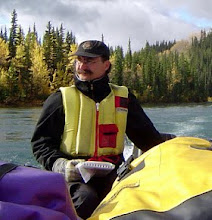The Lyrid meteor shower peaked on April 21st. Andrew and I decided to head out to Lake Laberge some 50 km North of Whitehorse to escape the lights of the city and watch for meteors. As we drove into the campground by the lake we saw a local group around a bonfire trying to keep warm while waiting for the sky to darken. We'd dressed for mid-winter since the sky was brilliantly clear and a slight northern wind came up the lake. We settled in by the boat launch, I set up my camera and we huddled into our camp chairs.
It wasn't long before a spectacular show of Aurora began, the red-tinged green curtain highlighting the stars beyond. And we began to see the occasional shooting star, quick streaks here and there. I've been a fan of meteor showers since I was a kid on the eastern prairies. In late summer I stayed out to watch the Perseids. In the early 1980s when we went back to the land in central Saskatchewan there was an especially impressive display – I counted over a hundred shooting stars in about half an hour. I was so impressed that when our first child was born a year and a half later in the same place we gave her the middle name "Celeste" to celebrate the sky and the wonders it holds.
From previous research Andrew and I knew the Lyrids were not as fast as the Perseids and were therefore somewhat less visible. But we also learned that the while Lyrids were slower, in the early evening they have a flatter trajectory entering the atmosphere and therefore a longer run across the sky. Bruce Mclure from earthsky.org calls them "earthgrazers – a loooong meteor that travels horizontally across the sky."
And we were rewarded for our early arrival. Just after 11 pm we watched a bright shallow streak head south somewhere miles East of the lake. As it approached the ground we watched in astonishment as it suddenly brightened and broke up into three distinct pieces. Andrew noticed a brief blue halo effect and then it blinked out. When we got home I was surprised to see that I had managed to get a photo of its demise. The exposure was somewhere around 30 seconds so it was just luck that we got anything at all. Later, neither Andrew nor I could remember if we'd heard a sound.
This post is dedicated to our son-in-law Stephen who shared his enthusiasm for the night sky with us during our visit to New Zealand earlier this year. Mahsi cho Stephen, we were smarter sky watchers this spring.


e.jpg)
.JPG)




NICE!
ReplyDelete